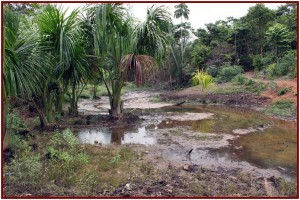A three-judge appellate panel in Ecuador has once again denied a Chevron (NYSE: CVX) attempt to block enforcement of the $18 billion environmental judgment against the oil giant. The panel this week ruled for the fourth time that Chevron was not entitled to use an order from an international investor arbitration to block the rainforest communities from enforcing their judgment, which was affirmed on appeal in January after 18 years of contentious litigation with charges of corporate, political and Ecuadorian legal system corruption brought by opposing sides.
Between 1964 and 1990, Texaco, subsequently bought by Chevron in 2001, drilled for oil in the northern region of Ecuador’s Amazon rainforest called the Oriente. While so doing, Texaco dumped billions of gallons of toxic oil, allegedly to cut costs.
In February 2011, after an eight-year trial that produced 220,000 pages of evidence, an Ecuadorian court found Chevron liable for deliberately dumping more than 16 billion gallons of toxic waste into Amazon waterways when it operated in Ecuador from 1964 to 1992 under the Texaco brand. The dumping severely hurt indigenous groups and caused an outbreak of cancer and other diseases, according to the evidence.
The court set damages at roughly $18 billion, which the plaintiffs say is a modest amount compared to BP’s liability in the comparatively smaller environmental disaster related to the Deepwater Horizon blowout in 2010. According to the many critics of Chevron, the Ecuador trial court decision was supported by a wide body of scientific evidence, much of it provided by Chevron.
The contentious litigation that resulted is also subject to press release war, as well as murkier corporate and politic maneuvering. Chevron issued a release when Nicolás Zambrano, the judge who issued the $18.2 billion judgment against Chevron, was recently dismissed from the bench due to his complicity in an emerging story of court corruption and drug trafficking in Ecuador.
Red herring or not, Chevron asked the appellate panel on four separate occasions to block enforcement of the judgment based on the arbitration. Each time the Ecuador appellate panel has found that Chevron, by refusing to post a bond, was not entitled under Ecuador law to suspend enforcement of the judgment. Thus far Chevron has not attacked the integrity of this panel.
The panel ruled that the rainforest communities — known as “the affected ones” for living for decades in one of the world’s most polluted areas — are not a party to the arbitration and thus not subject to its orders. The arbitration used to block the judgement is a deal between Ecuador’s government and Chevron.
“From the beginning, we have ruled that the failure of Chevron to avoid execution of the judgment is the direct and exclusive result of its failure to utilize the legal mechanism available” to post a bond, wrote the panel, whose members are Juan Encarcacion, Luis Zambrano, and Maria Delgado.
The latest decision in the view of Chevron critics, pressure groups and the plaintiff’s is a double blow for Chevron because it comes after a decision in 2011 by the U.S. Court of Appeals in New York that the Ecuadorian plaintiffs have a right to enforce their judgment “in any country in the world where Chevron has assets.”
“As part of its abusive campaign of never-ending litigation, Chevron continues to bring up the same tired issues with the Ecuador court and suffer the same tired defeats,” claimed Karen Hinton, the U.S. spokesperson for the Ecuadorian rainforest communities.
Well, yes, but so far no damages have been paid. Legal fees are another matter.



I think you are missing the larger picture here. There was indeed dumping without question, and it violated Texaco’s practices in other countries, but was apparently allowed by the government at the time under its reprehensible treatment of native peoples.
There needs in my view to be a cleanup. Then the question is – as always – who pays? Texaco’s and the government’s actions, as well as the lawyer defending them were and are reprehensible.
As a former visitor to Ecuador, color me skeptical about this whole story.
(1) It would be interesting to know what Chevron paid for Texaco, the offending oil company (if there indeed was an offense). This is akin to litigation in the US against successor companies to those alleged to have committed environmental lapses, especially those related to brake lining materials. Recall Federal-Mogul. (2) It would also be interesting to know the investment of US plaintiff lawyers in the Ecuadorian litigation. Related to that is the utter irresponsibility of environmental activist claims. (3) Another unstated issue is that of “turning back the clock” science, wherein responsibility is assessed for supposed dangers unknown at the time. This does not excuse willful dumping of wastes, the question being whether it was knowing and thus willful. (4) As a cancer survivor (so far) and widower of a cancer victim, I am always skeptical of claims about cancer-causing, which are VERY hard to support with real science. Does the record show any assessment of cancers among the indigenous people of the upper Amazon before oil exploration? I doubt it, for obvious reasons. (5) It is worth mentioning that there is a deep suspicion of plain old-fashioned Latin anti-Americanism involved in all this, especially in a leftist government allied with the notorious leftist regime in Venezuela. You can bet that if Ecuador ever succeeds in collecting any bounty from Chevron, it is highly unlikely any will flow to the Amazon people.
In other words, this Ecuadorian story has more holes in it than a piece of swiss cheese.
And in case you wondered, I have no interest in, connections to, nor investment in Chevron.